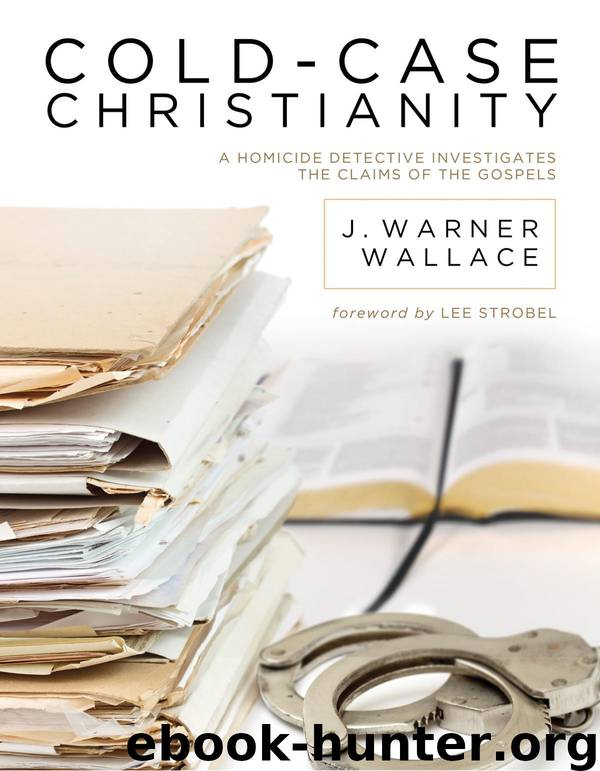Cold-Case Christianity: A Homicide Detective Investigates the Claims of the Gospels by J. Warner Wallace & Lee Strobel

Author:J. Warner Wallace & Lee Strobel
Language: eng
Format: mobi
Tags: Detective, Apologetics, Evidence, Christianity
ISBN: 9781434704696
Publisher: David C. Cook
Published: 2013-01-01T22:00:00+00:00
Working with All the Imperfections
Juries must understand that there is no such thing as a “perfect” case. Jurors are told in advance, for example, that they will not have access to everything that could be known about a case. Judges instruct juries that “neither side is required to call all witnesses who may have information about the case or to produce all physical evidence that might be relevant” (Section 300, Judicial Council of California Criminal Jury Instructions, 2006). Juries are not allowed to speculate about what is missing, but must focus instead on the reasonable inferences that can be drawn from what is not.
Something similar occurs when skeptics point to the allegedly “imperfect” or “incomplete” historical evidence supporting the claims of Christianity. Why, for example, don’t we have a complete set of documents from all the apostles who wrote in the first century? Why don’t we have some of the missing letters mentioned in the New Testament, like Paul’s prior letter to the Corinthian church described in 1 Corinthians 5:9 or John’s letter to Diotrephes’s church cited in verse 9 of 3 John? Why isn’t there more evidence from sources outside the biblical record corroborating the events described in the Bible (more on this in chapter 12)?
While expectations of perfection may assist defense attorneys as they attack the prosecution’s case and skeptics as they attack the claims of Christianity, these kinds of expectations are unreasonable. I’ve never seen a “perfect” investigation, and I’ve certainly never conducted one. All inquiries and examinations of the truth (including historical investigations) have their unique deficiencies. Jurors understand that they must work with what they have in front of them. Either the evidence is sufficient or it is not. Jurors can’t dwell on what “might have been” or what “could have been done,” unless they have evidence and good reason to believe that the truth was lost along the way. Juries cannot assume there is a better explanation (other than the one offered by the prosecution) simply because there were imperfections in the case; reasonable doubts must be established with evidence. In a similar way, skeptics cannot reject the reasonable inferences from the evidence we do have, simply because there may possibly be some evidence we don’t have; skeptics also need to defend their doubt evidentially.
DEFENSE ATTORNEYS PROVIDE ALTERNATIVE “POSSIBILITIES”
Download
This site does not store any files on its server. We only index and link to content provided by other sites. Please contact the content providers to delete copyright contents if any and email us, we'll remove relevant links or contents immediately.
The Secret Power of Speaking God's Word by Joyce Meyer(3184)
Signature in the Cell: DNA and the Evidence for Intelligent Design by Stephen C. Meyer(3132)
Real Sex by Lauren F. Winner(3016)
The Holy Spirit by Billy Graham(2944)
The Gnostic Gospels by Pagels Elaine(2527)
Jesus by Paul Johnson(2352)
Devil, The by Almond Philip C(2325)
23:27 by H. L. Roberts(2248)
The Nativity by Geza Vermes(2227)
Chosen by God by R. C. Sproul(2161)
All Things New by John Eldredge(2160)
Angels of God: The Bible, the Church and the Heavenly Hosts by Mike Aquilina(1964)
The Return of the Gods by Erich von Daniken(1943)
Angels by Billy Graham(1922)
Knowing God by J.I. Packer(1855)
Jesus of Nazareth by Joseph Ratzinger(1811)
The Gnostic Gospel of St. Thomas by Tau Malachi(1794)
Evidence of the Afterlife by Jeffrey Long(1786)
How To Be Born Again by Billy Graham(1778)
